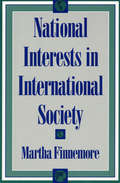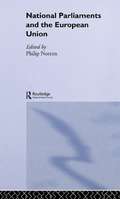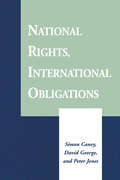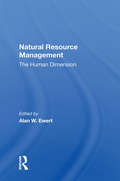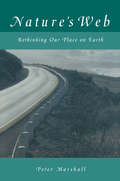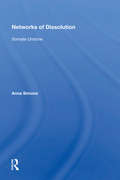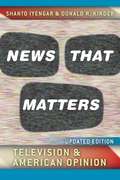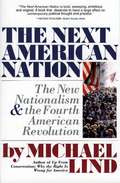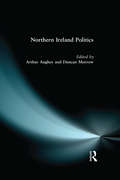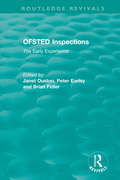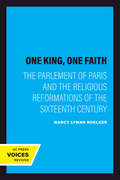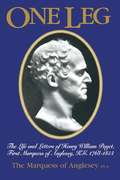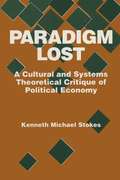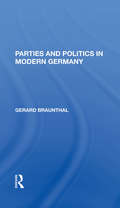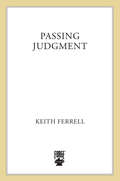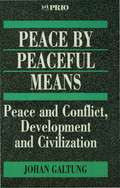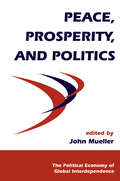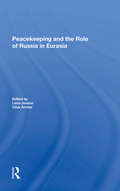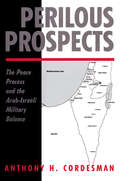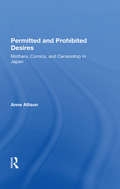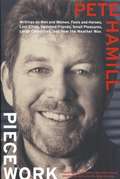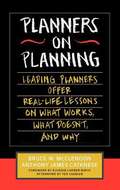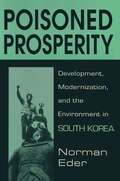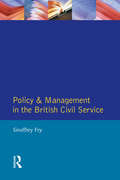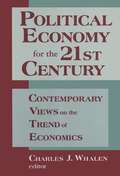- Table View
- List View
National Interests in International Society
by Martha FinnemoreHow do states know what they want? Asking how interests are defined and how changes in them are accommodated, Martha Finnemore shows the fruitfulness of a constructivist approach to international politics. She draws on insights from sociological institutionalism to develop a systemic approach to state interests and state behavior by investigating an international structure not of power but of meaning and social value. An understanding of what states want, she argues, requires insight into the international social structure of which they are a part. States are embedded in dense networks of transnational and international social relations that shape their perceptions and their preferences in consistent ways. Finnemore focuses on international organizations as one important component of social structure and investigates the ways in which they redefine state preferences. She details three examples in different issue areas. In state structure, she discusses UNESCO and the changing international organization of science. In security, she analyzes the role of the Red Cross and the acceptance of the Geneva Convention rules of war. Finally, she focuses on the World Bank and explores the changing definitions of development in the Third World. Each case shows how international organizations socialize states to accept new political goals and new social values in ways that have lasting impact on the conduct of war, the workings of the international political economy, and the structure of states themselves.
National Parliaments and the European Union
by Philip NortonThis guide is intended for busy legal practitioners and all other professionals who are involved in the criminal justice system and who require quick reference to the provisions of the 1994 Act.
National Rights, International Obligations
by Simon CaneyNationalism is once again rising and spreading. Nationlist movements are active throughout the world, demanding political recognition of their nations' identity. Yet the current revival of nationalism has taken place alongside claims that nation-states are becoming obsolete in an increasingly globalized world. In addition, now perhaps more than ever, people are conscious of humanity as a whole and are ready to take seriously the international dimensions of morality.In this collection of timely essays, distinguished moral and political philosophers examine issues raised by the competing claims of nationhood and internationalism from a variety of perspectives, and defend a variety of answers. Questions discussed include: Is humanity really divided into nations or are nations invented by nationalists? Does a nation have the right to be self-determining? If so, must each nation form a separate and sovereign state? Do our obligations stop at national boundaries? Do we not have obligations to human beings as such? Why then should we be less concerned about ?foreigners? than about our compatriots? Can we be concerned for social justice within societies yet not across the world as a whole? If we embrace ideas of human rights and global obligations, how do we establish what those rights and obligations actually are? Is it proper, plausible, or practical to aspire to such universal moral principles in a world characterized by national diversity and cultural difference?
Natural Resource Management: The Human Dimension
by Alan W EwertWritten by and for scholars, planners, and policymakers, Natural Resource Management: The Human Dimension focuses on issues such as the publics role in the decision-making processes of ecosystem management that affect how we use (or abuse) resources. It exposes the reader to a wide variety of applications of Human Dimensions Research, as well as to significant issues involved. One of the greatest needs in natural resource management is for a deeper understanding of the intricate relationship between humans and the natural environment. Human Dimensions Research, an interdisciplinary field involving a broad variety of social science approaches, seeks to fill this need by providing multidimensional assessments of peoples’ behavior, attitudes, and expectations toward natural resources and their uses. Written by and for scholars, planners, and policymakers, Natural Resource Management: The Human Dimension focuses on issues such as the publics role in the decision-making processes of ecosystem management that affect how we use (or abuse) resources. It exposes the reader to a wide variety of applications of Human Dimensions Research, as well as to significant issues involved. At a time when we are either loving our forests and parks to death or paving them over, a better understanding of the problems is critical if we are to create workable policies that will preserve and protect our natural resources
Nature's Web: Rethinking Our Place on Earth (Cassell Global Issues Ser.)
by Peter MarshallThis powerful book provides the first comprehensive overview of the intellectual roots of the worldwide environmental movement - from ancient religions and philosophies to modern science and ethics - and synthesizes them into a new philosophy of nature in which to ground our moral values and social action. It traces the origins and evolution of the dominant worldview that has built our industrial, technocratic, man-centered civilization, and brought us to the current ecological crisis. At the same time, it uncovers an alternative cultural tradition in the world's different religions and philosophies and describes how these ideas are now surfacing and coalescing to form an ecological sensibility and a new vision of nature which recognizes the inter-relatedness of all living things. Finally, this book integrates these varied traditions with modern physics and the science of ecology into a larger philosophical whole that provides the environmental movement with a comprehensive vision of an organic and sustainable society in harmony with nature. As ecological disasters continue to threaten our planet, becoming worse with every passing moment of indifference, it has become clear that we must take action. We must change our relationship with nature, and return to the days when our lives were intimately connected to and dependent upon the natural world. Nature's Web lays the foundations for that change by explaining where our complex ideas about nature come from, why they are wrong, and what we can do to change them.
Networks Of Dissolution: Somalia Undone
by Anna SimonsIn this penetrating and timely book, Anna Simons documents Somalia's impending slide toward anarchy. How do people react to a failing yet still repressive government? What do they do when the banks run out of cash? How do they cope with unprecedented uncertainty? These are some of the questions Simons addresses as she introduces the reader to Somal
News that Matters: Television and American Opinion, Updated Edition
by Shanto Iyengar Donald R. KinderAlmost twenty-five years ago, Shanto Iyengar and Donald R. Kinder first documented a series of sophisticated and innovative experiments that unobtrusively altered the order and emphasis of news stories in selected television broadcasts. Their resulting book News That Matters, now hailed as a classic by scholars of political science and public opinion alike, is here updated for the twenty-first century, with a new preface and epilogue by the authors. Backed by careful analysis of public opinion surveys, the authors show how, despite changing American politics, those issues that receive extended coverage in the national news become more important to viewers, while those that are ignored lose credibility. Moreover, those issues that are prominent in the news stream continue to loom more heavily as criteria for evaluating the president and for choosing between political candidates. “News That Matters does matter, because it demonstrates conclusively that television newscasts powerfully affect opinion. . . . All that follows, whether it supports, modifies, or challenges their conclusions, will have to begin here. ”—The Public Interest
Next American Nation: The New Nationalism and the Fourth American Revolution
by Michael LindAre we now, or have we ever been, a nation?As this century comes to a close, debates over immigration policy, racial preferences, and multiculturalism challenge the consensus that formerly grounded our national culture. The question of our national identity is as urgent as it has ever been in our history. Is our society disintegrating into a collection of separate ethnic enclaves, or is there a way that we can forge a coherent, unified identity as we enter the 21st century?In this "marvelously written, wide-ranging and thought-provoking"* book, Michael Lind provides a comprehensive revisionist view of the American past and offers a concrete proposal for nation-building reforms to strengthen the American future. He shows that the forces of nationalism and the ideal of a trans-racial melting pot need not be in conflict with each other, and he provides a practical agenda for a liberal nationalist revolution that would combine a new color-blind liberalism in civil rights with practical measures for reducing class-based barriers to racial integration.A stimulating critique of every kind of orthodox opinion as well as a vision of a new "Trans-American" majority, The Next American Nation may forever change the way we think and talk about American identity.*New York Newsday
Northern Ireland Politics
by Arthur Aughey Duncan MorrowHopes for a peaceful settlement in Northern Ireland have again put the politics of the province under the spotlight. This new text, written by acknowledged experts on Northern Ireland, provides an immediately accessible introduction to the multi-faceted nature of the politics of the region.
OFSTED Inspections: The Early Experience (Routledge Revivals)
by Peter Earley Janet Ouston Brian FidlerThe national programme of four-yearly school inspections was introduced in 1993, based on common criteria set out in OFSTED’s Handbook for the Inspection of Schools. Revised guidelines were introduced in February 1996, reflecting the lessons learned, and this book, originally published in 1996 articulates ideas that would have informed these revisions, including short essays by the Secretary of State for Education and Employment and the Education spokesmen of the Labour and Liberal Democrat parties. Registered inspectors, teachers, researchers, parents, school governors, policy analysts and policy makers all offer their experience of the strengths, weaknesses and outcomes of the OFSTED inspection process. The book is a companion to Improvement through Inspection? – Complementary Approaches to School Development by the same Editors, published and now reissued simultaneously.
One King, One Faith: The Parlement of Paris and the Religious Reformations of the Sixteenth Century
by Nancy Lyman RoelkerThis title is part of UC Press's Voices Revived program, which commemorates University of California Press’s mission to seek out and cultivate the brightest minds and give them voice, reach, and impact. Drawing on a backlist dating to 1893, Voices Revived makes high-quality, peer-reviewed scholarship accessible once again using print-on-demand technology. This title was originally published in 1996.This title is part of UC Press's Voices Revived program, which commemorates University of California Press’s mission to seek out and cultivate the brightest minds and give them voice, reach, and impact. Drawing on a backlist dating to 1893, Voices Revived</DIV
One Leg: The Life and Letters of Henry Wiliiam Paget, First Marquess of Anglesey, K.G. 1768–1854
by The Marquess of AngleseyLetters and unpublished material contribute to this dramatic, humorous, and romantic biography of the heroic nobleman written by his descendant. Henry William Paget, first Marquess of Anglesey, was born more than twenty years before the French Revolution. Like his famous contemporary the Duke of Wellington, he became a legend during his lifetime. As a youth he was in one scrape after another; in his forties he figured in a celebrated elopement and duel which caused much scandal; but he is best known for his greatness as a cavalry leader. His brilliant timing of the charge of his &“heavies&” at Waterloo averted disaster in the first crisis of that battle. Having lost a leg by one of the last shots fired on that sanguinary day, he was later known as One-Leg Paget. Anglesey was twice lord-Lieutenant of Ireland. He was still in high office two years before his death at the age of sixty-five. Among the famous figures prominent in this absorbing story are the Prince Regent, Queen Victoria, Sir John Moore, Lord Melbourne, Daniel O&’Connell and, of course, the &“Iron Duke,&” with whom Anglesey was often at odds but of whom in old age he became a very close friend.
Paradigm Lost: Cultural and Systems Theoretical Critique of Political Economy
by Kenneth M. StokesThis sequel to "Man and the Biosphere" is an account of the origins and development of a cultural, social energetic and systems theoretical contribution to critical Marxism. It examines: the intellectual contributions of the Russian philosophers, A.A. Bogdanov and A.I. Bukharin; Bogdanov's and Bukharin's contributions as a search for a unity of scientific knowledge; and a paradigmatic change from a closed mechanical system to an open systems paradigm.
Parties And Politics In Modern Germany
by Gerard BraunthalThis comprehensive text provides a detailed overview of the party system and politics of one of the most powerful states in the international arena. Noted scholar Gerard Braunthal surveys the parties in the Federal Republic of Germany and in the German Democratic Republic after World War II and in united Germany since 1990. By illustrating the cent
Passing Judgment
by Keith FerrellAs the national debate between Hollywood and the Christian Coalition heats up, one man must battle an entire town's prejudice to find a fundamentalist killer. With the 1996 U.S. presidential campaign upon us and the players ranging from the Hollywood elite to the Religious Right, Passing Judgment is a novel poised on the border between politics and religion. In this charged atmosphere, New Spirit stands at the center of Southern Christian fundamentalism, a high-profile showplace where everyone knows one another but no one is quite what he seems. And these followers and residents of New Spirit are clashing with their local devil...Baird Lowen. A highly acclaimed Hollywood director forced into early retirement as a result of tragedy on the set of his last masterpiece, Baird is content to fish for bass in the nearby pond and write incendiary articles about New Spirit. But when the fiery death of a fellow detractor spurs Baird to find the murderers, he must first uncover a plot of extortion that circles back on his own troubled past. National anti-drug crusader and gubernatorial hopeful Roy Duncan is the right-hand man to New Spirit's Reverend Frederick Prescott, and both are suspects in Baird's private search for the killers. But it is Roy who seeks Baird out with an offer he really can't refuse: Find Roy's blackmailer or suffer the exposure of his own tragic secret.
Peace by Peaceful Means: Peace and Conflict, Development and Civilization (International Peace Research Institute, Oslo (PRIO) #14)
by Professor Johan GaltungJohan Galtung, one of the founders of modern peace studies, provides a wide-ranging panorama of the ideas, theories and assumptions on which the study of peace is based. The book is organized in four parts, each examining the one of the four major theoretical approaches to peace. The first part covers peace theory, exploring the epistemological assumptions of peace. In Part Two conflict theory is examined with an exploration of nonviolent and creative handling of conflict. Developmental theory is discussed in Part Three, exploring structural violence, particularly in the economic field, together with a consideration of the ways of overcoming that violence. The fourth part is devoted to civilization theory. This involves an exploration of cultural violence focusing on the deeper aspects of cultures. Finally, the threads of these four approaches are drawn together with a focus on peace action - peace by peaceful means.
Peace, Prosperity, And Politics (The Political Economy of Global Interdependence)
by John MuellerAs we enter a new century, world affairs have been transformed. The leading countries confront no compelling or immediate major threats of a military sort; they all see the world in essentially the same way; there has been an enormous expansion of international trade and economic interconnections; and rapid technological expansion has facilitated international interconnections that substantially skirt standard political arrangements. This makes possible a reallocation of national effort from security to material concerns and a reasonable prospect for an unparalleled era of prosperity and peace.But less benign forces also persist. Ethnic conflict continues to plague the world, and a new challenge to the international order could be launched by an emergent or resurgent state. Moreover, the positive prospects of the global economy are not yet available for all nations. In result, politics - political choice - remains important.In this book, a group of political scientists, economists, and historians assess these important developments. They agree that important historical changes are occurring in international politics, but they differ in their perspectives and proffer different speculations about the new era and about the consequences of the emerging relationship between politics and economics. They also vary in the degree to which they are optimistic or pessimistic about the way things appear to be going.
Peacekeeping And The Role Of Russia In Eurasia
by Clive Archer Lena Jonson"As the number of peacekeeping efforts conducted internationally under the aegis of military forces increases, thers is more pressure to resolve the dilemma inherent in all peacekeeping activities-how to combine efficiency with legitimacy. This dilemma is particularly acute in the many conflicts that have mushroomed in the Eurasian region following the disintegration of the Soviet state. Given the history of Soviet Russian repression of ethnicnational entities, can Russia-the USSR's primary heir-be relied on to resolve rather than inflame conflicts in the other post-Soviet states and regions? In order to answer this question, the contributors to this timely volume evaluate the factors that guarantee Russia's intervention in its ""near abroad."" They debate whether Russian ""peacekeeping"" is legitimate according to international norms or whether it may be a harbinger of ""neoimperialism."" Finally, they explore the origins and effectiveness of Russia's intervention in four cases of regional conflict and discuss the complexities of broader multilateral involvement."
Perilous Prospects: The Peace Process And The Arab-israeli Military Balance
by Anthony H CordesmanNobody understands the delicate and dangerous balance of power in the Middle East better than Anthony Cordesman. In Perilous Prospects, he supplies the first account of the military and security concerns arising out of the Israeli-Palestinian peace process and the recent assassination of Prime Minister Rabin.Cordesman considers a number of possible futures for the region, and their effects on the peace process, ranging the outbreak of a new intifada, to war between Israel and Syria over the Golan Heights. He also provides an analysis of the internal security requirements of both Israel and a new Palestinian state, which are the key to any lasting settlement.Offering hard-headed analysis combined with hope for the future, Perilous Prospects is both timely and provocative.
Permitted And Prohibited Desires: Mothers, Comics, And Censorship In Japan
by Anne AllisonDesire is both of and beyond the everyday. In an ad for running shoes, for example, the figure of a man jogging at dawn on the Serengeti Plain both evokes a fantasyof escape and invokes a disciplinary norm to stay fit. The bottom line for thead, of course, is to create a desire to consume, the promise being that with thepurchase of these shoes, the consumer can realize yet also transcend the daily exhortationto perform.To say this differently, there is something both real and phantasmic about desire.Yet this notion seems contradictory. Isn't there a difference between the desireto be fit, for example, which is realizable, realistic, and, in these senses, realand the desire to escape routine everydayness, which, for most of us, is inescapablemost of the time? But is exercise real or phantasmic? Certainly noteveryone works out, and even those who make exercise a part of their reality maydo so in order to pursue a fantasy about themselves. And are escapes from dailyroutines phantasmic or real? An escape from the everyday is far more realizablefor some people than even fitness. But here too what is fantasy blends into (andbecomes indistinguishable from) the real: A vacation away from work may be ameans of ensuring a higher level of work performance when one returns.
Piecework: Writings on Men & Women, Fools and Heroes, Lost Cities, Vanished Calamities and How the Weather Was
by Pete HamillVeteran journalist Pete Hamill has never covered just politics. Or just sports. Or just the entertainment business, the mob, foreign affairs, social issues, the art world, or New York City. He has in fact written about all these subjects, and many more, in his years as a contributor to such national magazines as Esquire, Vanity Fair, and New York, and as a columnist at the New York Post, the New York Daily News, the Village Voice, and other newspapers. Seasoned by more than thirty years as a New York newspaperman, Hamill writes on an extraordinarily wide variety of topics in powerful language that is personal, tough-minded, clearheaded, always provocative. Piecework is a rich and varied collection of Hamill's best writing since 1970, on such diverse subjects as what television and crack have in common, why winning isn't everything, stickball, Nicaragua, Donald Trump, why American immigration policy toward Mexico is all wrong, Brooklyn's Seventh Avenue, and Frank Sinatra, not to mention Octavio Paz, what it's like to realize you're middle-aged, Northern Ireland, New York City then and now, how Mike Tyson spent his time in prison, and much more. This collection proves him once again to be among the last of a dying breed: the old-school generalist, who writes about anything and everything, guided only by passionate and boundless curiosity. Piecework is Hamill at his very best.
Planners On Planning: Leading Planners Offer Real-life Lessons On What Works, What Doesn't, and Why
by Bruce W. McClendon Anthony James CataneseOffers pragmatic information on the realities of day-to-day practice from some of the most innovative, respected, and visionary leaders in the planning profession today. Bridging the gap between theory and practice, this guide provides straightforward lessons from today′s most effective planners on the core values, skills, and techniques needed for success. Through personal, real-life examples from the trenches, these experts explain in their own words what works, what doesn′t, and why.
Poisoned Prosperity: Development, Modernization and the Environment in South Korea
by Norman R. EderA study of environmental degradation, this work presents the environmental problems of South Korea. The effects of rapid industrialisation and modernisation are documented along with the choices and actions which are available to the country.
Policy & Management British Civil Servic
by Geoffrey K. FryA detailed study of the changes which have taken place in the British Civil Service since 1979. It is intended for political and policy scientists, and sociologists.
Political Economy for the 21st Century: Contemporary Views on the Trend of Economics
by Charles J. Whalen Hyman P. MinskyThis text provides an alternative to conventional economics, drawing on the neoclassical and non-neoclassical insights of Lester Thurow, Robert Heilbroner, Alice Amsden, Barry Bluestone and 11 other prominent economists from America and England. It is intended to provide productive analyses of several contemporary economic problems.
